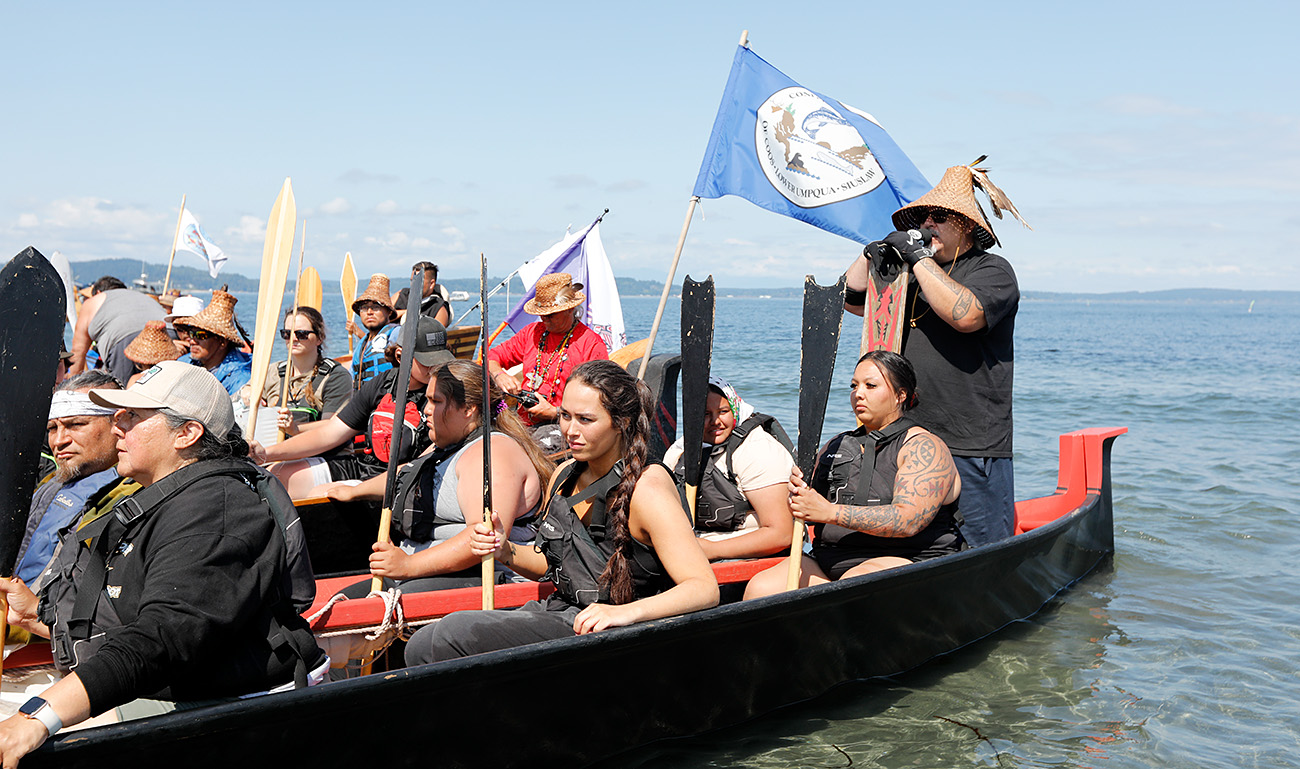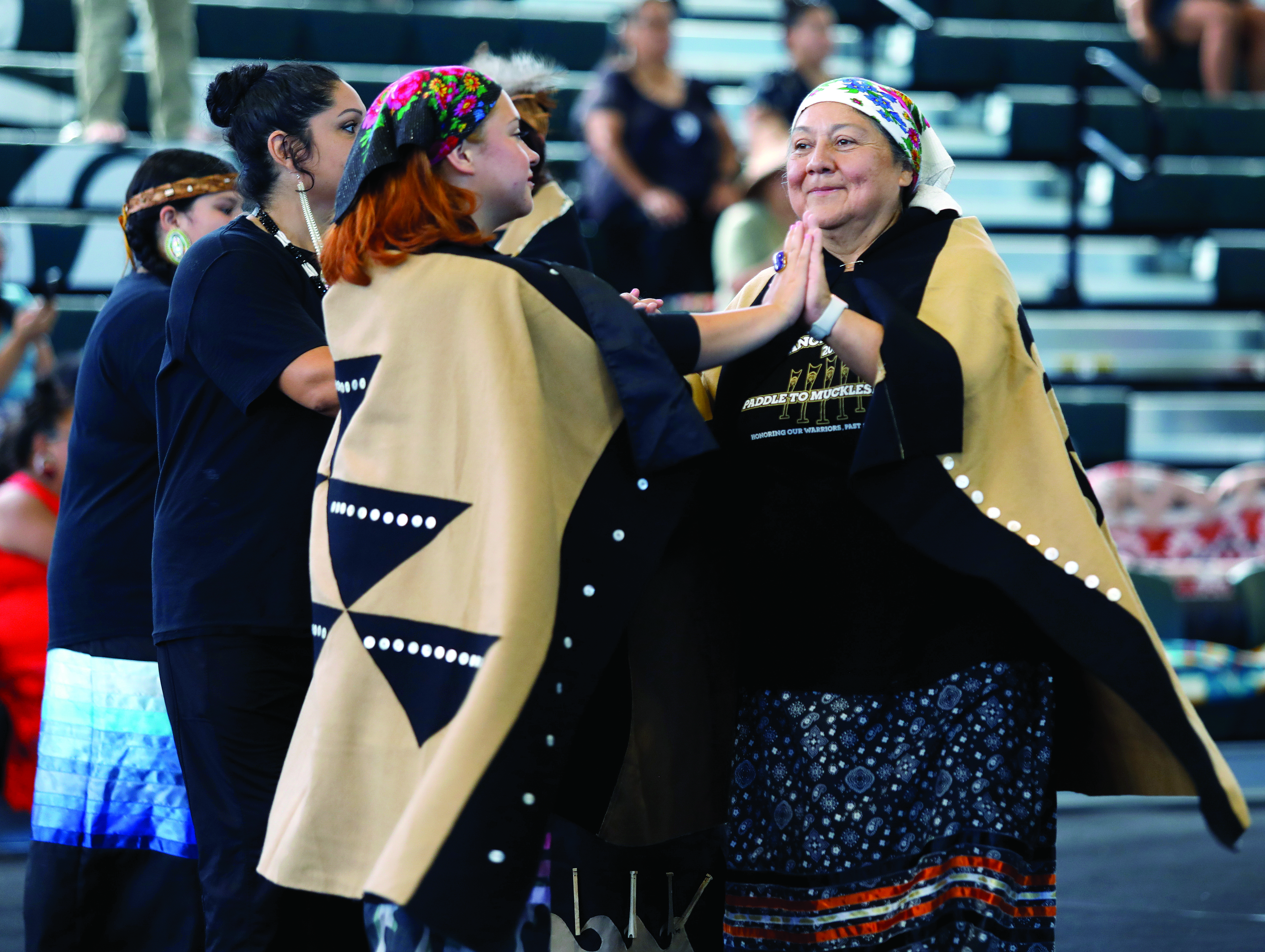Culture
Paddle to Muckleshoot Landing Day attracts thousands of participants

By Danielle Harrison
Smoke Signals editor
SEATTLE – More than 100 canoe families from Tribes across British Columbia, Oregon and Washington arrived on the shores of Alki Beach Park for Paddle to Muckleshoot Landing Day on Sunday, July 30.
Thousands of people crowded along the shoreline, some peering through binoculars and trying to catch a glimpse of the approaching canoes, which marks the completion of the paddling portion.
The excited crowd didn’t have to wait long. Over the sound of the drums and a light breeze under a blue sky, cheers and clapping could be heard as the first canoe, On Shaman, appeared on the horizon at approximately 10:40 a.m., 20 minutes earlier than expected.
“We welcome you to our shores, and we’re so happy you are here today,” Muckleshoot Tribal Council Chair Jaison Elkins said. “This is a blessed and joyous day.”
The theme for this year’s journey was “Honoring Our Warriors Past and Present,” and it’s the second time the Muckleshoot Tribe has hosted the event, the first being in 2006.
Landing Day was followed by a dinner at the new Muckleshoot Community Center, where 8,000 to 10,000 people gathered to celebrate Indigenous culture through potlatch and protocol, which continued until Sunday, Aug. 6.
This year, the Grand Ronde Canoe Family, comprised of youth and adults, navigated Stankiya, which means “coyote” in Chinuk Wawa, and qisqis, “Blue Jay,” as they paddled to Lummi, Sammish, Swinomish, Tulalip, Suquamish and finally Muckleshoot ancestral homelands along the shores of Alki Beach.
Support crew members drove in vans to set up camp and cook for the tired travelers every night. Longtime Canoe Journey participants Bobby Mercier and Brian Krehbiel served as skippers.
Stankiya was the first of the Grand Ronde family to arrive at approximately 11:20 a.m. Mercier asked permission in Chinuk Wawa and then English to come ashore, as is customary during Landing Day.
“We are raising our hands to the people of this land,” he said. “We’re honored to be on your beaches and we ask permission to come ashore.”
“We welcome you to the homelands and waters of the Muckleshoot people,” Elkins replied. “You have permission to come ashore.”
Landing Day created a mix of emotions in both participants and observers as the COVID-19 pandemic had upended large community and cultural celebrations for more than three years.
“It’s been very emotional,” Tribal member Zoey Holsclaw said. “It’s so good to be back on the water with everyone. It’s also really special because it’s my daughter’s first Canoe Journey.”
The last time Tribal member Benjamin Powley participated in journey, he was only 14 years old. Now 18, he felt more experienced and able to fully engage.
“I loved it all,” he said. “It was really fun to paddle and feel so connected to everyone. Going through COVID was hard, so being able to enjoy journey once again was really nice.”
Krehbiel faced extra adversity on this year’s journey. Right before it began, he pulled his calf muscle and was subsequently confined to a boot and compression sleeve. However, it didn’t ruin his determination to participate, especially since it would be the first time skippering the new canoe, which the Tribal artisan made for his daughter’s 21st birthday a year earlier.
“It handles like a dream,” he said. “Hobbling around on crutches wasn’t fun, but everyone wanted to help. … Just seeing all of our families here and having so many Elders coming, it’s great. It’s the most I’ve ever seen.”
Tribal Council members in attendance during Landing Day or journey itself included Jon A. George, Lisa Leno, Brenda Tuomi and Michael Cherry.
“It’s a very healing journey,” Cherry said. “When you are there, you are surrounded by so much love. We were able to bless the canoe family as they were waking up one morning and made them breakfast. My mom got to see the first canoe come in and the first canoe go out. It was so incredible.”
It was Tuomi’s third Canoe Journey experience.
“It really is spiritual, powerful and good medicine,” she said. “There’s nothing like standing on the shore at Landing Day and watching the canoes come in. You feel your ancestors and also see your future.”


 Tribal members Mabel, left, and Joanna Brisbois, daughter and mother respectively, dance to the Frog Song as the Grand Ronde Canoe Family perform protocol during the Paddle to Muckleshoot 2023 Canoe Journey at Muckleshoot Indian Tribe’s Community Center on Wednesday, Aug. 2, in Auburn, Wash. (Photo by Michelle Alaimo/Smoke Signals)
Tribal members Mabel, left, and Joanna Brisbois, daughter and mother respectively, dance to the Frog Song as the Grand Ronde Canoe Family perform protocol during the Paddle to Muckleshoot 2023 Canoe Journey at Muckleshoot Indian Tribe’s Community Center on Wednesday, Aug. 2, in Auburn, Wash. (Photo by Michelle Alaimo/Smoke Signals)
On Wednesday, Aug. 2, the Grand Ronde Canoe Family had its opportunity to take the stage for protocol. Approximately 100 members of the Canoe Family began at approximately 9 a.m. and concluded two hours later.
At protocol, Mercier introduced himself in Chinuk Wawa and English.
“Let’s wake up this crowd,” he said. “Let’s wake up the people still sleeping in camp.”
Although the hour was relatively early and most Canoe Family participants hadn’t had much sleep, they performed traditional songs with enthusiasm and pride.
Afterward, Mercier thanked the Muckleshoot Tribe for its hospitality.
The 2023 journey marked the 31st anniversary of the event, first held in 1989. Canoe Journey wasn’t held during 2020, 2021 or 2022 due to COVID.
Grand Ronde’s Canoe Family first participated in the 2005 Canoe Journey, which landed on Hollywood Beach in Port Angeles, Wash. Some participants fondly recall subsisting on Clif Bars and Red Bull energy drinks. Nowadays, they travel with a full support staff who set up camp and prepare meals.
The Canoe Journey began in 1989 with the “Paddle to Seattle,” which was held in conjunction with Washington’s 100th anniversary of statehood. That year, the state and Indigenous governments signed the Centennial Accord, recognizing Indigenous sovereignty. Fifteen Tribes and First Nations participated in the Paddle to Seattle.
Today, upwards of 120 canoes representing as many as 90 U.S. Tribes and Canadian First Nations and up to 12,000 people participate in the annual journey, paddling canoes, operating support boats, acting as ground crew, singing, dancing and sharing their cultures and traditions.
Canoe Journey was designed as a family-friendly event to familiarize Northwest Tribes with the trade routes used by their ancestors and to promote a healthy lifestyle free of substance abuse.
The 2023 Canoe Journey closed on Sunday, Aug. 6, with Muckleshoot songs and dances, giveaways, transfer of the stick to the next hosting Tribe and a retiring of the colors.
The Suquamish Tribe in western Washington will host the 2024 Canoe Journey.
